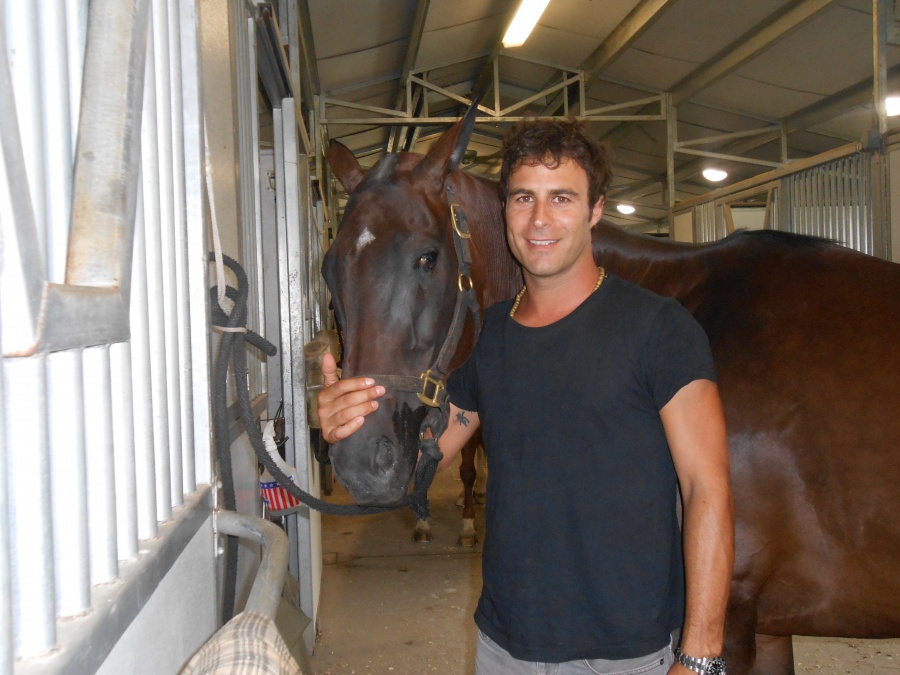Chatting With Water Mill Polo Star Martin Pepa

“This is almost my first house,” Martin Pepa says, motioning toward the barn where three of his 20 polo ponies are being tacked up by grooms with the nimble, caring expertise of nannies with precious babies.
The “almost house” he is talking about is a barn at Equuleus Polo Club in Water Mill, a seemingly endless spread of gently rolling land zigzagged by white fences. The pastoral quietude is broken now and then by the cantering hooves of ponies being exercised, the clatter of a horse trailer coming in, and hissing from the jets of water that keep the grass as impeccably groomed as the people who turn out for the polo matches.
Pepa is “almost” not exaggerating, too, in that a professional polo player has many homes—as do his horses, which travel with him to posh but temporary spots around the globe for much of the year. Like many of the players who come to Bridgehampton for the summer, he is a native of Argentina. And this summer he kicks off his boots in a rental near the stable. This fall, he will go to Tianjin, China to play with The Super Nations Cup that brings together four elite teams from Argentina, England, Hong Kong and the U.S. much of the winter, he plays in Palm Beach.
For Pepa, like many professional polo players, life is not only itinerant, but hardly the non-stop glamour projected by those glossy polo-theme magazine ads. His day-to-day is packed with training and practice on the horses, crunching and stretching at the stable’s own gym, and ice—not in the margaritas—but on muscles. “You get a lot of injuries in every game,” he said. He turned and yanked up his shirt, to reveal a festering purple-black bruise on his back from a ball being walloped. The game requires focus like your life depends on it, with over four tons of galloping horseflesh to not get smashed and stomped by, and seven other mallets swung by guys who may be your buddies off-field, but right now are in a Spartacus state of mind.
Other injuries? He laughed, “Well, I’ve been playing with two broken fingers.” But it’s been worse, like when he broke his shoulder.
“Everybody thinks we (polo players) have a great life, that we go and party out all the time,” he said. “I don’t go out, except mostly to restaurants.” He loves sushi, and among favorite restaurants are Suki Zuki in Water Mill and Sen in Sag Harbor. “After we won the Monty Waterbury Cup August 3, I didn’t even go out partying. I went to my sponsor’s house and had pizza and Diet Coke.”
For Pepa, another incentive is to hang out with his long-time girlfriend, Paige Allardice, also an equestrian who has swept up championships riding hunters, including Grand Champion at the Hampton Classic. Despite her own daring riding career, or maybe because she knows how dangerous it can be, he said, “She’s almost like a mother, she worries so much.”
His two brothers, Juan and Jorge, have careers in the U.S. financial world and play polo as a hobby, and they are often on the sidelines at his matches. He also has a Hamptons “family” in his sponsors and team, especially his closest friend of many years, eight-goal player Christian “Magoo” Laprida.
The other best girl in his life is his nine year old-old bay mare named Alita. And there are others, mostly mares “because they have softer mouths,” meaning they respond better to the rider’s direction. Players use ten horses in a match, for ten minutes each. “Your horse is 50-60 percent of your game, for some, maybe more,” he said.
Also vital to excellence are the grooms, the team manager, and of course team members. Professional players achieve rankings from 0 to the very rare 10-goal, and Pepa has achieved the impressive ranking of five-goal. A pro team’s members are added up to make their total “goal,” high or low. Pepa likes playing the aggressive Number 1 position on the team (Numbers 2 and 3 control the game, and 4 is the defensive player).
Pepa began playing in the Hamptons with the White Birch team. “I always tell people that when they first play, they should go to White Birch. It’s a huge organization.”
For five years, he managed the Black Watch team that had Nacho Figueras as a pro, and then jumped into the high goal with a friend, Michael Borrico, then moved to the Circa team, where he said he “found his best years of polo.”
“It is really, really hard to be a polo player,” he said. No kidding! The qualities that make for a good pro polo player, he said are “elasticity, balance and power to control the horse, mental preparedness, being physically fit, studying the videos of past games to strategize for the next.” Put all that together, and the tricky element is “being able to read the play before you do it.” In the heat of the game, a paradox takes place: “You have to be quick, but you have to be patient.”
While polo might be viewed as an elitist game, Pepa prides himself on being self-made. “I did it myself,” he said. Unlike many players, he didn’t come from a polo family, even though he grew up near the polo epicenter in Argentina. “My dad never rode a horse. But when I told him I wanted to play polo instead of having an academic career, he got me a mallet. My mom said she would kill me if I played.” He laughed. “She didn’t kill me, but she prays for me in church.”
He admits to being “nervous before every game, especially in semi-finals. But I never think, ‘We won, and now we can relax.’ After every game, I’ll get off the horse, and think, ‘I want more!’”



